

Lesson 4
The Existence of God
Objective:
| Directions: In this lesson we will study both the strategy and the information to use in discussing with a person the question of "Is there a God?" In your Workbook at No. 1, you will find a section in which to record the steps of the strategy. These steps are scattered throughout the lesson so you will be completing the elements of the strategy bit by bit as you work through the lesson. Note that when you are to record something in the Workbook, the number of that section of the Workbook lesson is provided as a guide. |
Strategy: First, agree on a definition of God. (WBK 1A)
Before we can know whether there is a God, we must first define what such a being would be like? What characteristics do you think a divine being would have to possess? Think about it before you look at the next sentence, then look at the sentences below and complete number 2 in the lesson. (WBK 2)
| God is a spirit being, who is eternal, all-knowing, all-powerful, and everywhere. |
This definition becomes the beginning point of your discussion of God's existence.
Strategy: Next, we discuss the methods of proof. (WBK 1B)
There are two types of proof. The first is proof by observation. It comes through the physical senses. Thus we can know that a dog is in our yard because we see him and hear him bark. Our physical senses have told us that the dog is there.
Whether God exists, of course, cannot be proved in this way because, by definition, He is spirit and, thus, cannot be seen or touched by the physical senses. As non-material, He cannot be proved by physical observation. A Russian cosmonaut said he had been through outer space and could testify there was no God because he had not seen him. He was thinking of God’s existence in the wrong realm.
There is also, however, proof by reasoning. By reasoning we prove many things we cannot observe by our physical senses. Back to the dog. Maybe you don’t see the dog in the yard but you see footprints from a dog, and you see something the dog left in your yard and you reason to the conclusion that the dog was there. If you observe what only dogs can cause, then you reason that a dog has been in your yard. By reasoning this way we may not reach certainty, but we draw the conclusion that is most likely.
To take another example, you want to know whether you can trust a person with an important job. So you think back. I asked him to write a letter to someone and he didn’t do it. I asked him to take me to town and he never showed up. I asked him to visit someone in the hospital and he said he would, but he never did. I don’t think I will trust him with this important assignment. This process is reasoning to a conclusion. We do it every day.
So we cannot prove by observation that God exists, but we can reason from observable effects for which only God, as we have defined Him, could be the cause. Since God, by definition, is something that cannot be observed by physical senses, we must reason to the best possible conclusion about whether God exists. The key question, then, is this: "Is it more reasonable that a spirit being exists who is eternal, knows all, sees all, is all powerful and is everywhere, or is it more reasonable that such a being does not exist?" This type of reasoning is called "effect to cause." (WBK 3&4)
Strategy: Now we find a common point of agreement from which to begin. (WBK 1C)
Our method for approaching the answer to the question of God's existence is to start with something virtually all can agree on--something all can observe: The universe exists. Except for those who doubt any existence at all, we can use the universe as a common starting point. The earth and stars, and the sun and moon, and human beings exist. We know this from physical observation. So we use the existence of the universe as a point of beginning. (WBK 5 and WBK 6-top of drawing)
This approach is, in fact, what the Bible itself recommends. In Romans 1:19-20, Paul writes that "since the creation of the world His invisible attributes, His eternal power and divine nature, have been clearly seen, being understood through what has been made." So God expected people to look at what exists and to ask, "Where did this come from?" (WBK 5)
So the world, the universe and human beings are here. Something brought these into existence. Their presence asks, "Where did we come from?" These are effects. What is their cause?
Strategy: Ask four basic questions about the universe, each of which has two and only two alternatives. Examine both alternatives to each question to show which answer has the strongest possibility of being correct. (WBK 1D)
From this beginning point of agreement
that the universe exists, we can discuss with someone a series
of questions, each of which has only two answers--a yes or
a no. Both the "yes" and "no" possibility
of each question must be considered to see which is more in harmony
with what we know, which is more likely to be true.
Based on this answer we will then move to the next step.
| Directions: Now write the word "Beginning?" in the triangle to your drawing. (WBK 6-drawing) |
Question 1: Did the universe have a beginning? (WBK 7)
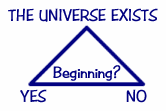
There are only two alternatives to answer this question--yes, the universe had a beginning or no, it has always existed. Which alternative has the most support from observation? There is strong agreement among scientists that the universe has not always been here. Such proposals as the "steady state" theory or the oscillating model have been made in an attempt to show that the universe is eternal. These, however, have generally been discarded as impossible. Dr. William L. Craig, in his book, The Existence of God, stated, "Both the steady state and oscillating models of the universe fail to fit the facts of observational cosmology. Therefore we can conclude once more that the universe began to exist" (pp. 59-60).
Dr. Edwin Hubble has plotted the speeds of the galaxies and says they are moving apart at enormous speeds. From this observation, scientists conclude that there was a point of beginning when these galaxies came into existence and started their journeys.
Dr. Robert Jastrow, founder of NASA’s Institute for Space Studies, has written in God and the Astronomers, "Now we see how the astronomical evidence leads to a biblical view of the origin of the world. The details differ, but the essential elements in the astronomical and biblical accounts of Genesis are the same. The chain of events leading to man commenced suddenly and sharply at a definite moment in time, in a flash of light and energy" (p. 11). (WBK 7A)
Look at these points which suggest that the universe has not always been here. Energy is being changed from a useful to a non-useful state. If everything had always been here, there would be no useful energy left. (WBK 7B)
Also, since, according to the second law of thermodynamics, unattended systems tend toward chaos, had the earth always existed with no intervention, it would by now be in chaos. Your car, your TV set, your camera, your yard--all these as well as your body, confirm this law that everything tends toward disorder. (WBK 7C)
So the evidence is quite clear that the universe had a beginning. It has not always been here. All but a few scientists have drawn this conclusion.
| Directions: Look back at the drawing and circle the "yes" side of beginning since that is the more likely answer to the question about a beginning point. |
| Directions: Add the word "Plan?" in the second triangle of your drawing. (WBK 6-drawing) |
Question 2: Did the universe begin with a plan? (WBK 8)
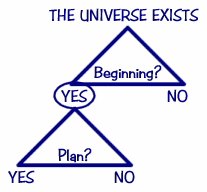
The universe had a beginning but was that beginning accidental and spontaneous, that is, by chance, or was the beginning with a plan? Let’s look at both possibilities.
From observation we find that the solar system, our universe, the sun, the moon, the earth and human beings have many features that are systematic, orderly, and precise. The universe works like a giant clock. It has moving parts. It has order, system, and design. The earth, for example, is exactly the right distance from the sun: closer and we would burn up, further away and we would freeze. The tilt of the earth on its axis provides the seasons we need. Gravity is exactly the strength we need to hold us on a rotating earth. Plants and animals are balanced to provide an exchange of oxygen and carbon dioxide. Our air has in it exactly the elements needed to sustain life. Plants, animals, and human beings have within themselves the power to reproduce. Cut yourself and the damaged cells replace themselves. These and hundreds more similar observations declare the systematic, orderly, and precise nature of life and of our solar system. (WBK 8A)
Dr. Hugh Ross, Ph. D. in astronomy, states, "Astronomers and physicists widely acknowledge that the only reasonable explanation for the intricately harmonious features of the universe, our solar system, our planet--all ingeniously focused on the requirements for life--is the action and ongoing involvement of a personal, intelligent Creator." (William Dembski (ed.) Mere Creation, p. 371. Ross lists twenty-nine characteristics of the universe and forty-five characteristics of the solar system that must be just as they are for life to exist on earth. He calculates the possibility of these happening by chance on even one planet in the universe at one in "one hundred billion trillion trillion trillion" (p. 381) (WBK 8B)
Now the critical question. Can we find an example of anything that has order, system, function, and design that got that way by accident rather than by plan? Can we imagine a camera, for example, appearing by accident? Could, then, the far superior human eye have come by accident? A car by self-generation? A computer without a plan? a TV set rising spontaneously out of a pile of electronic parts? the Empire State Building without blueprints? Could any of these things come into existence purely by chance, by accident? (WBK 8C)
If none of these lesser things could have come into existence without a plan, then how could the great universe or the beings that live on the earth have come with no plan, entirely by accident? If everything we know of with order and design was planned, is it conceivable that the greatest of all things would come purely by accident? Nothing in our experience allows such a conclusion. Can you stand at the Royal Gorge in Colorado and imagine that the bridge spanning the canyon came by accident? Then can you imagine that the immeasurably more magnificent river, mountains, trees, and sky surrounding that bridge came by accident? (WBK 8C)
Of course we have discovered by accident some things that already existed or by accident someone might pour together substances to make something useful. But is there anything that functions systematically and with order that got that way by accident?
Sir Fred Hoyle, in his book The Intelligent Universe, used this analogy. "What are the chances that a tornado might blow through a junkyard containing all the parts of a 747, accidentally assemble them into a plane, and leave it ready for take-off?" He also computes that for a blindfolded person to solve a Rubik’s Cube, he would have to make one move every second for 1.35 trillion years. If it stretches your imagination to think of that, imagine what it would take to get the 200,000 amino acids required for each human cell by chance and, still by chance, that they all accidentally appeared at exactly the same time so they could work together in a single cell.
Hoyle concludes, "As biochemists discover more and more about the awesome complexity of life, it is apparent that its chances of originating by accident are so minute that they can be completely ruled out. Life cannot have arisen by chance." (pp. 11-12, 19, 251). (WBK 8D)
The greatest chess player in the world, Gary Kasparov, was defeated at chess by a highly sophisticated computer. Would anyone seriously consider that this computer came into existence by accident? That someone turned up on a deserted island where there were mineral deposits and frequent lightning, and there sat "Big Blue." Yet, some ask us to believe that the even greater human brains that built and programmed this computer resulted from an accumulation of chance events.
Biological discoveries now demonstrate that each cell not only contains matter but contains information as well. In fact, the nucleus of each human cell contains more information that all 30 volumes of the Encyclopedia Britannica put together.
For what exists to have come from accident, then, not only must matter have sprung into being in a functioning form but so must the information coded within it. (WBK 8E)
So we reason that if everything in our experience with order and design came from a plan, then the universe with its order and design on the greatest scale of all, must also have come from a plan.
Some who deny the existence of God propose a "big bang." This explanation suggests that all existing matter began from a very small but powerful substance the size of a geometric point with no dimensions which exploded to give us all thast now exists. Their initial substance, they say, came into existence by accident and its accidental explosion gave us all we have. This explanation falls short in two ways: (1) it provides no explanation for the origin of the beginning substance and (2) evidence does not support the proposition that all things came from the same substance. (WBK 8F)
Which explanation, then, is more in harmony with what we know? Plan or accident? Which is more reasonable?
Remember our approach. Each of our four questions has only two possible answers --yes or no. We are not asking which answer can be proved beyond all doubt. We are, rather, asking, "Which of the two possible alternatives is the more likely?"
Did our universe come by accident or by plan? Our experience clearly suggests that "by plan" is the more likely alternative.
| Directions: Mark your answer as "yes" or "no" on the triangle labeled "plan." (WBK 6-Drawing) |
| Directions: Now write the word "Planner?" in the third triangle of your drawing. (WBK 6-drawing) |
Question 3: Did the plan have a planner? (WBK 9)
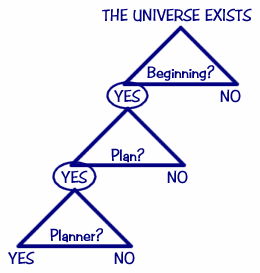
Obviously, if there is a plan, there must have been a planner: no blueprints without an architect, no shop drawings without a designer, no specifications from which to build a car without an engineer. If an object’s order requires that it came from a design, that design requires a designer. Certainly our experience can provide no case of a plan without a planner. Since there is no support for a plan without a planner, then if there is a plan, there must be a planner. (WBK 9)
| Directions: Mark the "yes" or "no" on planner. (WBK 6-drawing) |
| Directions: Now add "Pre Existing Force?" to the drawing in your Workbook. (WBK 6-drawing) |
Question 4: What must the planner of the universe be like? (WBK 10)
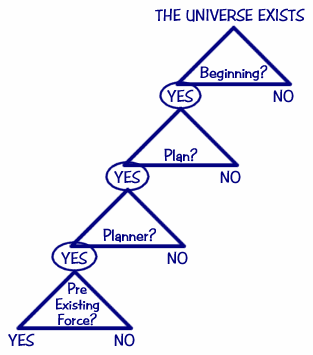
This planner of the universe designed and brought all material things into existence, set them in order, gave them the ability to reproduce, and sustains their existence. Since He existed outside of matter, He must be non-material or spirit. Since He created time, he must be eternal. Since He created space, He must be outside of space and thus is everywhere. He must have unlimited knowledge to know how to create life, reproduction, and order. He must have tremendous power to bring all these things into. Again we take the "yes" alternative. We cannot conceive of the planner of the universe without such qualities.
| Directions: Mark the "yes" to the "pre-existing force" triangle in your Workbook. |
Strategy: So where have we come? This planner must have had the attributes we said must define God. (WBK 1E)
| Directions: Add the last word ("GOD") to the drawing in your Workbook. (WBK 6-drawing) |
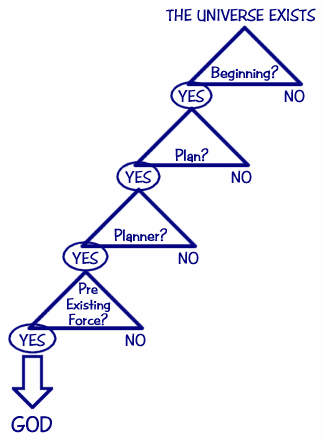
Several other arguments may also be made for the existence of God. (WBK 11)
| A. | Human beings have a sense of purpose not present in lower animals. Where did this sense of purpose come from if we are only accidental creatures? Why do only humans have this sense of purpose if we ascended from lower forms? Why do only humans desire to have a meaningful existence, to produce something beneficial, to improve the human condition, to be of service to others? If we are the product of lower forms of life, then where, along the chain of development, did such a desire creep into our psyche? (WBK 11A) |
| B. | Human beings have a conscience. Why do we have a sense of right and wrong when animals do not? If humans are but the product of a series of evolutionary accidents, where did this conscience come from? Does not this characteristic of humans suggest that a moral being made us and imparted to us this quality? Surely this is more likely than to say conscience was accidentally inserted between two steps of an evolutionary chain? |
| C. | Human beings can think on a level far beyond that of any other life forms. If humans sprang into existence from nothing or from lower animals, how can we account for our astounding mental capacities? Complex mathematical thinking and abstract reasoning are so far beyond what animals can do mentally. Such processes are surely beyond the power of an accumulation of accidents to produce. The gap between humans and any other form of life is so great that chance is not an acceptable explanation for the differences. |
| D. | All civilizations throughout history have believed in some form of a higher being. Where did the notion of a power greater than humans come from? Why this universal longing for a power greater than ourselves unless such a power put that desire in his creation? No great world civilization has been primarily atheistic. Why not? |
So, we have suggested five basic reasons for believing in God: (1) as the best explanation for the existence of the universe, (2) because humans have a sense of purpose; (3) because humans have a conscience, (4) because of the powers of the human mind, and (5) because all civilizations have believed in a higher power.
| Directions: You should now be able to draw the diagram at No. 6 and use it to explain "Why I Believe in God." Start with "The Universe Exists" since that should be a point of agreement. Then discuss the four essential questions and show that each of them has only two possible answers. At each stage, discuss which alternative is more reasonable. In the space provided in your Workbook, sketch now from memory the complete drawing from top to bottom and then check it with your earlier drawing to see if it is right. |
Faith is the result of this evidence and reasoning. (WBK 12)
The Bible calls faith an outcome. Faith is the result of an examination of the evidence. Romans 1:19-20 tells us that God expected people of old to look at the universe as evidence and conclude that there was a creator and then to honor Him. The evidence was to produce faith. John teaches the same: "these (signs) are written that you may believe that Jesus is the Christ the Son of God" (John 20:31). Look at the evidence, he says, and faith will be the result. Hebrews 11:1, likewise, teaches that faith is a "conviction" that unseen things are real, and that conviction becomes the basis of how we act. (WBK 12A)
We do not, then, decide what we would like to be true and then "leap" to that conclusion calling it faith. Rather, we look at the evidence and draw the most reasonable conclusion. Once we have concluded that a spirit-being exists, we take that conclusion as a foundation for our faith and action. (WBK 12B)
The faith of scripture, then, is not founded on personal feelings or experiences. Faith, as the Bible presents it, is a conclusion arrived at by a careful examination of the evidence--and the evidence is sufficient for us to conclude that a spirit-being with all power and all knowledge not only exists, but made the universe and all that is in it. Believing that, we accept our accountability to the God who made us and we seek to live in a way that pleases Him. This faith grows as we become closer to God and He becomes more real as an important factor in our lives. We grow to trust in Him and to believe that He knows best for our lives.
We do not, then, believe there is a God simply because we want to believe it. We come to that conclusion by evidence and reason. Having found a belief in God to be the best answer for the cause of what we observe in the universe, we then begin to develop our own personal relationship with Him through faith. By living with Him as a part of our lives, He becomes more real to us on a personal basis. (WBK 12C)
Useful Reference
|
|
| ©1999 Oklahoma Christian University |